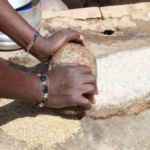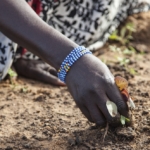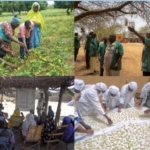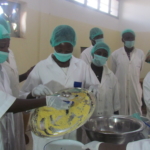


Institut de Recherches en Sciences Appliquees et Technologies
Food Technology Incubation Center (CRITA)
Burkina Faso Niger
12/2019—12/2023
Empowering agricultural households is an important strategy for tackling malnutrition in sub-Saharan Africa. The first phase of the Child Nutrition project was launched in 2016, with a focus on north and central Burkina Faso, with the aim of improving nutritional status of children aged six months to twelve years. During its first phase, the project introduced high-nutrient flour formulations based on combining cereals and legumes in households and at the Food Technology Incubation Center (CRITA) at Lebda in Burkina Faso. Improved high-protein content cowpea and Bambara groundnut varieties (with two to three times higher protein than local varieties) were also introduced. With these composite flours, the protein content of local dishes such as tô and couscous covered the daily protein requirements of the children. Furthermore, the addition of non-timber forest products, such as pulp of baobab (Adansonia digitata) and néré (Parkia biglobosa) fruits greatly improved the iron content of infant porridge. The acceptability of enriched tô, mugdugu and porridge is related to taste, while the social and cultural contexts also influence the adoption of these improved products. The first phase bore out these results thus far in three villages from the same region.
The purpose of the second phase of the Child Nutrition project is to improve the nutritional status of children aged between six months and twelve years at selected sites in Burkina Faso and Niger using an integrated approach. The research will take all the different factors along the agricultural value chain into account, starting with the choice of crop varieties, crop production and harvest methods up to storage, processing and consumption. In synergy with other projects, the nutritional effect of farming techniques like crop association or Zai techniques, and post-harvest treatments will be studied. The project will assess the effects of storage practices on the nutritional value and food safety of final food products —including mycotoxin content—and the team will elevate good practices. Farmers, women processors, rural households, and children will be exposed to storage practices reducing mycotoxin contamination for grain and final products. Farmers will also learn good farming practices for preserving grain nutritional value and enhancing food safety. In addition, the project will refine knowledge about the nutritional value of forest products like the fruit pulp of baobab, néré, and jubjube (Ziziphus mauritiana) to further optimize flour formulations. Women will learn cooking practices, while households and the incubation center will be introduced to technological processes for preserving and improving nutritional value. Socio-economic analysis will be performed to better understand the social and cultural context for improving the nutritional status of children. Various types of knowledge documentation and dissemination (e.g., booklets, scientific publications, audio messages) will be developed to promote good practices.
This project will contribute to improving knowledge on good nutritional practices in Burkina Faso and Niger. The increased knowledge of nutritional effects of specific farming practices, soil treatments, and crop storage methods will improve people’s short- and long-term health. At the household level, the project will bring knowledge about technological processes, nutritional flour formulations, and consumption patterns that improve the nutritional quality of meals. Incubation centers will produce and sell high-nutrient products. The consumption of these products will improve children’s nutritional status and health. In the end, the knowledge of good nutritional practices on product processing will be beneficial for household nutrition. A discussion platform will be created among village health actors of relevance to child nutrition. Women will be empowered with good agricultural and cooking practices for resilience. Women’s income will increase by selling local fortified snacks such as “Mugdugu”. Beyond the villages, the populations at large will potentially benefit from the project results. Subsequently, scientific documents drawing from the project achievements and results will be published.




